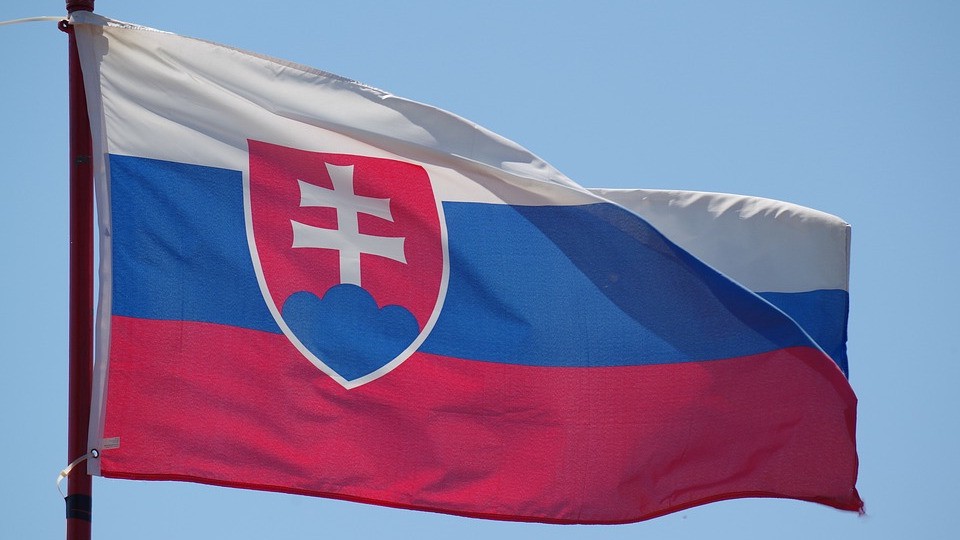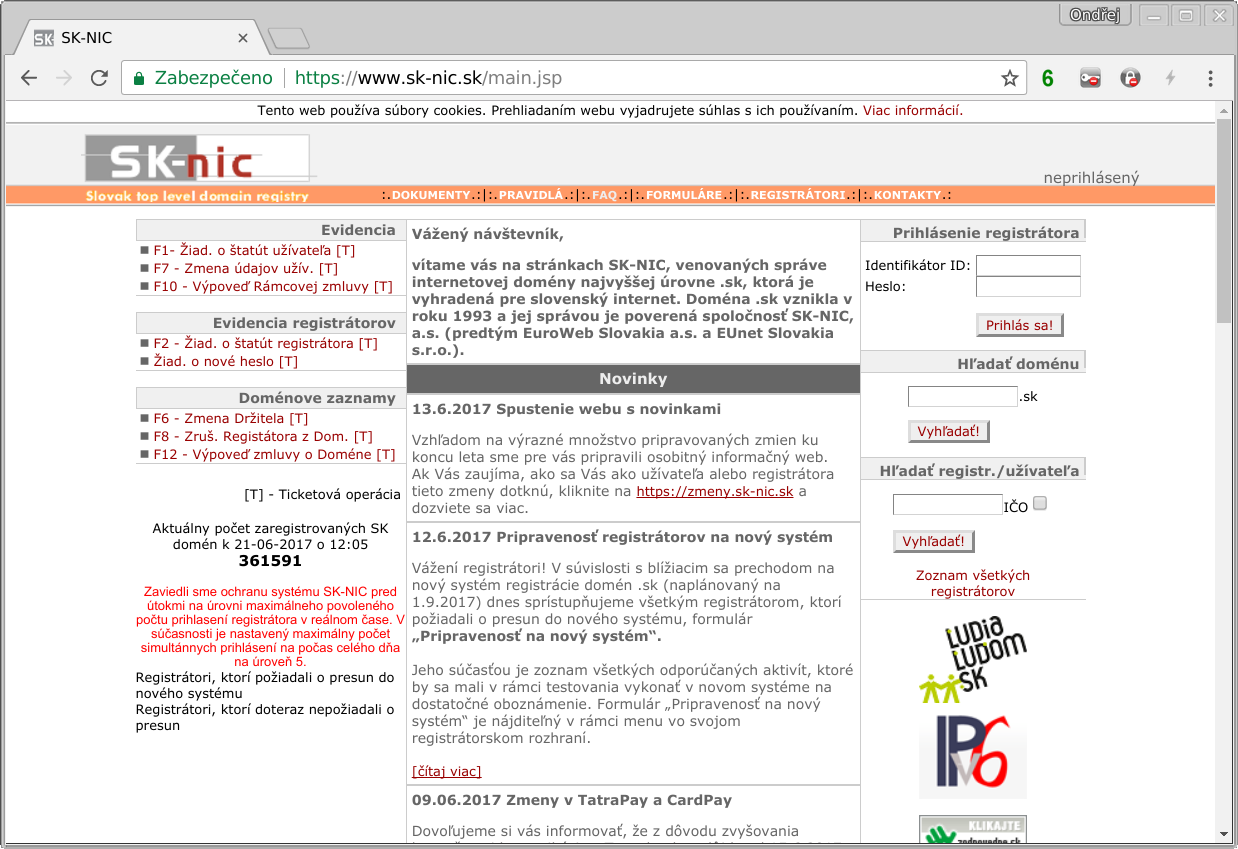How Slovakia stole the national top-level domain .SK

As a Czech citizen, I am proud of the operator of our national top-level domain (TLD), the CZ.NIC association. They not only perfectly manage the registry, improve security and reliability, but also among other things develop excellent and well-known open source software - for example the FRED , Knot DNS daemon domain name registry, or BIRD internet routing daemon . This software works for two thirds of all Internet exchange points. They even developed the Turris Omnia open source home router, with automatic updates and other useful stuff. And all of these are side projects for managing the national TLD .CZ.
The nations of the Slovaks, our closest neighbors, with whom we shared our country until 1993, were not so lucky. Their top-level domain name registrar is a private company that abuses its monopoly. She works under a contract with the Government of Slovakia, which can not be broken without the consent of the company. And all because of the fraud that occurred in 1999.
How to steal a top-level domain
When Czechoslovakia ceased to exist on January 1, 1993, two TLDs, .CZ and .SK were delegated to two newly formed countries, and the Czechoslovak .CS domain began its decline. The Slovak government transferred the management of the .SK domain to SANET , the Slovak academic network operator. They handed over the management of the informal group EUnet Slovakia, based at the Faculty of Mathematics and Physics of the Comenius University in Bratislava. The delegation to the ICANN registry was as follows:
Registrant: Slovakia top-level domain (SK-DOM)
EUnet Slovakia
Comenius university
MFF UK, Computer Center Mlynska dolina
842 15 Bratislava Slovakia
In 1995, the people who ran the TLD at Comenius University began an attempted raider seizure, renaming their private company Softwarehouse sro (sro - limited liability company) to EUnet Slovakia sro, which looked like the name of an informal group. In addition, they moved to a small office, filmed on the campus, so that they had the same postal address. Then in 1999 they sent a request to ICANN for a small change of registration data - delete the words “Comenius University” and add the letters “sro” after “EUnet Slovakia”.
')
ICANN did not feel the catch and made this small change to clarify the address. In fact, at this moment there was a seizure of the management of the .SK domain from an informal non-profit group. Nine days after this change, on August 19, 1999, the company was sold to Euroweb International USA, located in the USA. Raider capture was successful.
The need for a new registration system
Immediately after the seizure, the new owners began negotiations on the introduction of a new registration system - at that time the domain name ending in .SK was free and accessible to all people legally located in the territory of Slovakia. The new system introduced a payment for registration, which allowed new owners to monetize their investment. The system earned in the year 2002, since then nothing has changed.

Site registrar .SK little changed since 2002
Problem noticed
In 2004, the Slovak government and the community realized what had happened to their national domain. The Ministry of Transport, Post and Telecommunications sent a letter to ICANN asking for help. ICANN sent a negotiator who proposed organizing an association to serve the national domain, which will include all owners. This association was founded on February 2, 2004, when trilateral negotiations between the government, the association and Euroweb began.
Of course, Euroweb was not going to give away its domain, but the pressure exerted by the government and the association was great. As a result, they sold the company back to Slovakia, which suspended the negotiations. The company was organized by SK-NIC, which was owned by the SWAN telecom operator associated with another company called Danubiatel.
Government Confirmed Contract
New domain owners soon discovered that they were working with the registry without any contracts with the Slovak Republic. They began to actively lobby the government. In 2006, Pavol Prokopovich, then the Minister of Telecommunications, signed a contract with SK-NIC on the last day of his tenure.
The contract established a SK-NIC committee with 7 members - three of whom represented the community, two - the government, and two - SK-NIC. The contract can be terminated only with the consent of all members of the committee, which means it is almost impossible.
Machine for money and without innovation
The national TLD in Slovakia is the opposite of .CZ. It does not have the English-language version of the SK-NIC website and DNSSEC technology support, and the registration system does not have an API. Registrars have to create web crawlers to be able to automatically register domain names for their clients.
Already several times the TLD has completely disappeared from the Internet for a while. If someone wants to change the domain owner or simply change the delegation to a new server, he will need to make a written request, notarize him and send it by post to SK-NIC.
In addition, foreigners still can not register domains. If a foreigner wants to register a domain on .SK, he will have to either open a company in Slovakia, or ask the registrar to find intermediaries. This mode is already used for more than half of all domains.
SK-NIC for sale
Recently, the pressure on the SK-NIC has begun to increase again. Its current owners could decide that owning a company with a guaranteed annual income of more than four million euros is not worth the pressure exerted on them. In addition, they became the owners of the fourth mobile operator in Slovakia. Therefore, they decided to offer the company to the investor. Now there are negotiations with the British firm CentralNic, Ltd. about to add a .SK domain to its large portfolio.
CentralNic works with several general purpose TLDs, as well as special second level domains such as .COM.DE and two country TLDs, .LA and .PW.
Domain .LA is for the Asian country Laos. CentralNic also advertises it as “the world's first TLD for the city,” meaning Los Angeles, and also promotes it as the TLD for Latin America. Worse, the company has registered many valuable TLD names and sells them at prices higher than normal. As a registrar, they are able to register any domain without any payment. Most online communities consider such actions as inappropriate . Many registrars, including CZ.NIC, are trying to deal with this.
Another TLD for a country owned by CentralNic is .PW. It was originally intended for the Republic of Palau. This is an island nation associated with the United States in the Philippine Pacific Ocean, located 800 km east of the Philippines and north of Indonesia. It is promoted as an acronym for "Professional Web". According to Symantec, this domain is popular with spammers . Again, nothing to be proud of.
Will the domains return to the community?
It is clear that the Slovak online community is not happy about the opportunity to lose the Slovak national domain, having missed it in favor of a company like CentralNic. Enthusiasts organized a petition for the return of the .SK domain to the residents of Slovakia and are now trying to force the government to negotiate to improve conditions for working with the country's TLD.
However, strong personal connections between government members and SK-NIC do not simplify the task. For example, Patrick Krauspe, who is currently advising the Slovak government, is the former managing director of SK-NIC. In addition, ordinary people often do not understand the problem that arises when a private office manages a national domain without any supervision whatsoever.
Let us hope that the attempts of our friends from Slovakia to improve the Slovak Internet will succeed.
This story was written based on the results. talk at IT17 conference with Ondrey Yombik from Platon Technologies.
Source: https://habr.com/ru/post/357382/
All Articles